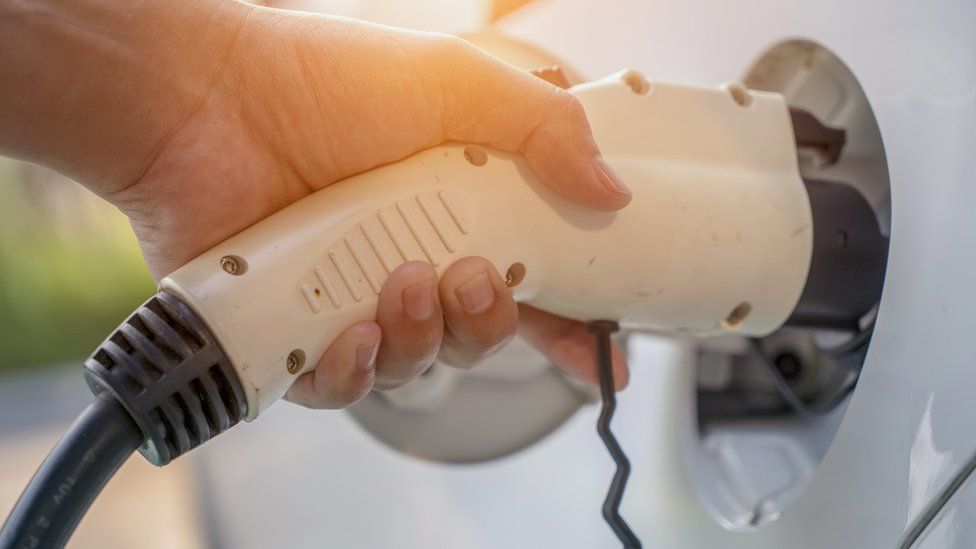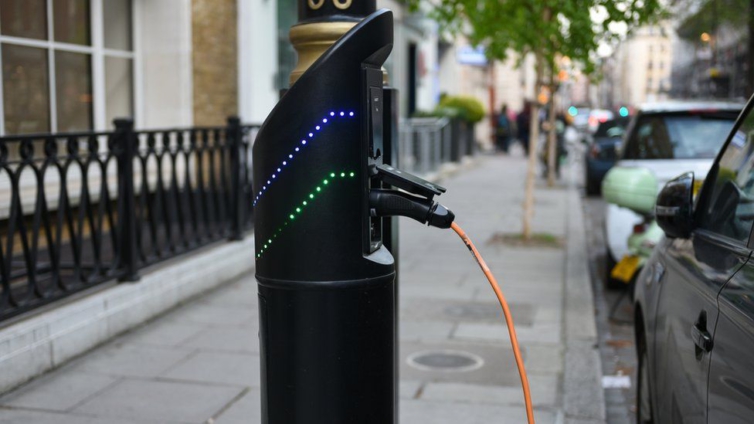The rollout of electric vehicle charging points has fallen behind what is needed to meet a planned ban on new petrol and diesel cars, the Policy Exchange think-tank says.
There's a risk of "charging blackspots" in small towns and rural areas unless the rollout speeds up, it says.
The report says the UK will need 400,000 public chargers by 2030, up from 35,000 currently.
Transport Secretary Grant Shapps said the UK's network is "world-leading".
But the influential think-tank said that to meet demand when new conventionally-fuelled cars and vans are prohibited in 2030, the annual rate at which charge-points are being installed must increase from about 7,000 over the past three years to 35,000 over the next decade.
Researchers recommended that the government should issue contracts to private firms to install charge-points in areas where they are sparse.
This would mark a switch from the existing policy of offering grants, and would be similar to offshore wind farm auctions.
Under the proposal, a price cap would be introduced for charge-points that received government support, to avoid operators exploiting local monopolies.
The report called for local authorities to be given Department for Transport funding for dedicated teams tasked with boosting rollout in residential areas.
In the foreword to the report, Simon Clarke, a Conservative MP and former minister for regional growth and local government, wrote: "Whereas a driver of a petrol car can travel confidently from Land's End to John O'Groats, knowing that they can refill the tank every few miles, that is not yet the case for EVs (electric vehicles).
"Some areas have naturally built up impressive coverage, such as central London, but vast swathes of the country have not.
"This important report sets out a way to meet the challenge," he said.
The report said the government should focus on areas where it isn't delivering enough public charge-points, including the north west of England, Yorkshire and Northern Ireland".

Policy Exchange senior research fellow Ed Birkett said: "Companies are rolling out charge-points at a record rate, but there's a risk that some areas of the country won't get enough charge-points and will be left behind.
"We're concerned about patchy deployment of charge-points, which runs against the government's plans for levelling up and a strong and connected Union."
£1.5bn investment
Transport Secretary Grant Shapps insisted the UK's charging network is "world-leading", adding: "From Cumbria to Cornwall, drivers across the country should benefit from the electric vehicle revolution we're seeing right now."
He announced a further £20m of funding for local authorities to install 4,000 more on-street charge-points across the UK. These will allow residents without access to off-street parking to charge their vehicles.
In November, Prime Minister Boris Johnson brought forward the ban on sales of new petrol and diesel cars and vans from 2040 to 2030 as part of his "green industrial revolution".
He also pledged to pump £1.3bn towards charging infrastructure over the next four years.
Data from the Society of Motor Manufacturers and Traders shows battery electric models took 17% of the new car market in 2020, up from 3% during the previous 12 months.
RAC motoring group spokesman Rod Dennis agreed that parts of the country risked being left behind
"Without a big increase in the number of charge points right across the UK, certain parts of the country risk getting left behind as 2030 approaches. Everyone remembers what happened when broadband started to be rolled out and some areas were left with poor connections.
"It would be a major policy failure if something similar happened in the next few years with communities missing out on good charging provision."
Latest Stories
-
CAF launches new look Champions League trophy ahead of first leg of final
4 minutes -
ISRQ2025: Dansoman Cluster B settles score with Theorose School, storms into semifinals
26 minutes -
Tekpetey wins Bulgarian Cup double with Ludogorets
28 minutes -
Bomfeh cautions public against over-reliance on audio and video recordings in public discourse
39 minutes -
Lawrence Baidoo: The African Schools Football Championship 2025 experience
48 minutes -
Joint Police and National Security operatives storm Wontumi’s residence with search warrant
51 minutes -
GFA President called me to provide structure and save Ghana football – Winfried Schaefer
1 hour -
Arrest of Adenta Kumi a “disgrace to the rule of law” – NPP’s Justin Kodua
1 hour -
National Security Operatives, Bureau of National Investigations and Kaakaamotobi: Is the Legitimacy of Certain Security and Intelligence Institutions Under Further Threat? (Part II)
1 hour -
Africans lost nearly $70M to denied visa applications to Europe in 2024
2 hours -
BoG Governor warns of risks despite signs of macroeconomic stability
2 hours -
NAGRAT urges government to stop ‘romanticising’ school violence and act
2 hours -
Ghana’s 450,000 barrels of light crude oil may only last 16 days
2 hours -
Heart of Lions eye crucial win against Young Apostles – Bashir Hayford
2 hours -
Mahama withheld Chief Justice petitions for six weeks – Godfred Dame claims
2 hours

